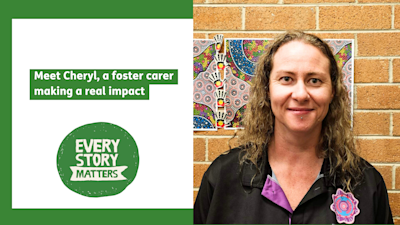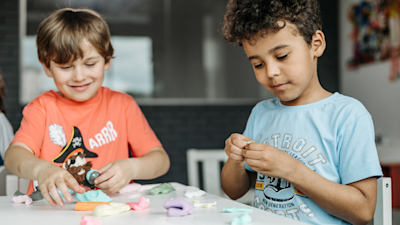When she was a young girl, Nicole had a dream – she wanted to ‘adopt’ lots of children and live in a fairy tale existence where everyone was happy and never wanted for a thing.

Image: Happy young mother embracing small preschool son, sitting on couch at home together, using educational applications on smartphone
Well, she’s come close, while the fairy tale proved to be a fantasy Nicole has been able to provide many children and young people with a happy and loving space as a foster mum. And that, she says, is better than any dream.
“Growing up I saw lots of movies where children were adopted, or became part of blended families,” she said. “It always worked out happy in the end and I thought, that’s what I want to do.
“But as I got older, I realised being a carer was a major commitment – it isn’t anything like it looks in the movies, and people are depending on you to help them through some of the most difficult times of their lives.”
Nicole knows all about difficult times. Shortly after being approved to become a Foster Carer in July 2018, her world took a mighty spin when she was diagnosed with breast cancer. While most people would have just retreated to concentrate on their own treatment, the single mum of two biological daughters (aged 11 and 14) had one primary thought – I can’t tell anyone, or they’ll stop me being a carer.
“I had a young Aboriginal person living permanently with me, and I was also doing respite when I got the diagnoses,” she said.
“I was worried about telling people because I didn’t want my foster son to be moved on – it would have been a terrible outcome."
“But I have the most amazing kids. I spoke to both my daughters about it, and how we might have to stop the caring, and they just said, ‘no Mum, don’t stop – we can help heaps more’ and they did. They did so much more around the house and really helped keep things going while I was in treatment, so we never had to stop caring.”
In April this year Nicole was given the all clear from cancer and she is currently providing care for three foster children aged three, seven and nine, along with providing regular respite and emergency care.
Nicole speaks from experience, she has family members in foster care and when she was younger her home was a haven for those in need. Nicole says she learnt about foster care through these experiences.
“We always had ‘extra’s’ coming to stay with us when I was in my late teens. Friends of the family who had nowhere else to go.”
The young man for whom she was caring during her cancer scare has since returned to New South Wales to be closer to family - a move which Nicole pushed for.
"It’s so important to keep those ties to family strong and robust.”
“Caring for a young person with a cultural background other than your own does present challenges,” said Nicole. “This young man was originally from New South Wales, so I really pushed the Department for him to have a lot of family contact with his siblings, who still live in New South Wales. Obviously, that had its own set of difficulties, but I am so glad I kept insisting on that cultural and family connection to be maintained.”
“I keep in touch, and he always knows I’m here if he needs to talk about anything,” she says.
Whilst in her care, Nicole established a relationship with the young man’s sister, so he was able to maintain regular contact with her. And she made a few trips so he was able to see her.
For Nicole, knowing that she helped give the young person confidence to make the journey to New South Wales, and to stay resilient when the family arrangement didn’t work out the way they’d hoped, is part of the reason she keeps giving so much of herself to foster care. “I just know that no matter how tough things are in my home, it’s never as bad as what the child has been through to begin with,” she says.
“Seeing the improvement in all of the children who have been in my care, how they’ve become more comfortable, open, learning to read, making friends; just seeing them happier than when they first arrived, that’s enough reward.”
Nicole started working as a Teachers’ Aid when she was in the last year of her finance degree; she loved working with children so much that she decided to switch courses and graduated with a teaching degree last year – then COVID-19 hit.
“That [COVID19] made working full-time impossible” she said. “I was also home schooling four children during the lockdown, so now things have eased up a bit I am doing part-time relief work.”
Nicole says that working with such a diverse range of children – both as a carer and in her teaching work – she has come to understand how vital the connection to culture is, no matter what background a child comes from.
“We all have our cultural needs, our family ties – sometimes that means as carers we need to extend our own knowledge of what’s important, what’s vital to a child’s identity and well-being."
“Belonging, and connections with that belonging, is the most important thing in life for us all.”


